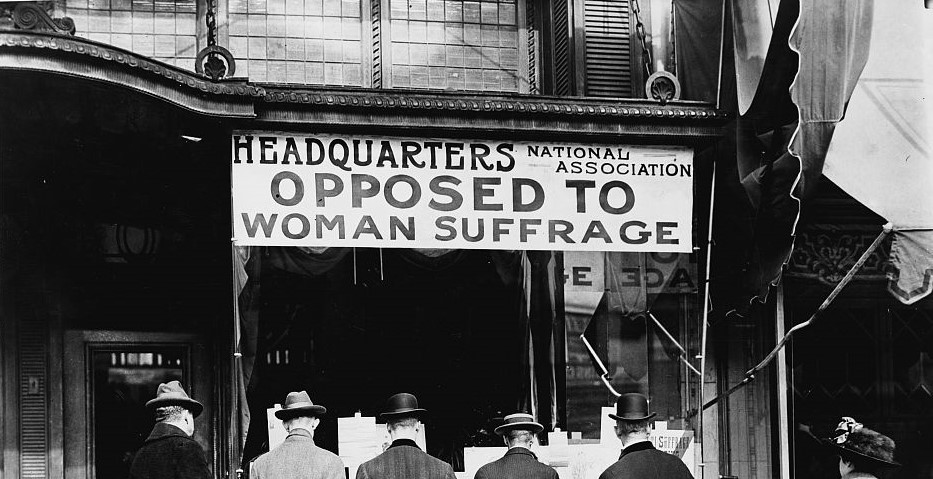Like any progressive reform movement, the women’s suffrage movement was met with opposition from both men and women who believed that it would destroy the traditional order of the family. While many people, both men and women, were avid supporters of the movement to give women the vote, there was a very large movement against this idea. This opposition made the passage of the 19th Amendment more difficult and did, indeed, set the movement back in the United States.
Opposition to suffrage, women’s and the overall idea of universal voting, can be clearly seen as a theme since the idea rose up with the Enlightenment philosophies of Britain and France. With a group of aristocrats looking to keep their positions of power and retain the traditions of the government, many were opposed to the idea of giving everyone the vote. Philosophers such as John Locke created a stir by stating these radical ideas in pamphlets, books and novels. Revolutionaries such as the Founding Fathers in the United States and, in France, Robespierre and Marat, took these ideas and attempted to put them into action in new, more democratic societies. In many ways, these revolutions created even more aversion to the Enlightenment ideals, including universal suffrage, largely due to the fear of revolts and violence such as that in France. In Britain, the rise of the progressive Whigs and other progressive reform movements created a fear of revolution. Many politicians put their guards up against these supposedly radical ideas because of this, and because of their unwillingness to change the old governmental order. This progressed through the ages, with many groups attempting to put down universal human rights ideals such as suffrage. Eventually, this led directly to the anti-suffrage movement that rose up to combat the women’s suffrage movement in the US and Britain.
The anti-suffrage movement rose up in the United States as the demand for the right to vote became more and more prominent. With the abolition of slavery and the granting of the vote to Black men in the United States, the idea of women’s suffrage grew as an expanding new movement. This created even more disruption for those angered by the changes of the post-Civil War Reconstruction era, who felt threatened by the massive shifts in traditional values that were building in this period. They felt that the vote for women would change things even more, ruining the family and the old traditions placed on women. Furthermore, the new threat of Western states allowing women the right to vote, such as Colorado in 1893, sparked even more fear.
In order to combat the supposed enemy of family values, politicians and prominent members of society created local anti-suffrage leagues across many states, such as the Nebraska League Opposed to Women’s Suffrage. Often, they were made of men who were opposed to these ideas, but there were also groups of women who opposed the suffragist movement. One example of this was the Women’s Anti-Suffrage League of Massachusetts, a very active group of women who fought to stop the suffragists. Indeed, many women were against the movement, largely due to religious reasons and the belief that a woman’s place was in the home raising children. Many of these women were wealthy, often the wives of prominent social members who were against the women’s suffrage movement. Josephine Jewell Dodge and Kate Douglas Wiggin, both wealthier members of society and both opposed to suffrage, exemplified this point. Dodge was the wife of a wealthy New York businessman, and, at one point, the head of the National Association Opposed to Women’s Suffrage. Wiggin was a popular children’s book author. Both believed that women should be relegated to the background, and that their purity would be muddied by the filthy world of politics if given the right to vote. Indeed, this was the view of many women who opposed the women’s suffrage movement. They were, in many ways, the face of the anti-suffrage movement, as their opposition was promoted as a way to speak against the supposedly hysterical and absurd women fighting for the right to vote.
Ultimately, in 1920, the 19th amendment was passed and women’s suffrage was granted. However, it is undeniable that the anti-suffrage movement, led by men and women opposed to the movement, did set back the passage of the law. The movement was strong, particularly in the upper echelons of society, due to the common wish to hold on to the old order of the home and a fear of progressive reform. Clearly, this movement and the strength it held, being influenced by politicians and members of high society, caused many setbacks for the women promoting the suffrage movement. However, it is also clear that it didn’t stop there. With the rise of minorities demanding the vote later in the century, similar movements rose up in opposition to universal suffrage. Even to this day, with organizations such as the ACLU working to equalize voting for prisoners and other marginalized groups across the country, many remain opposed. It is an issue that has followed the idea of universal voting rights since its founding, and will ultimately follow it to its conclusions.
By: Emma Davis, Molly Brown House Museum volunteer
Sources:
https://www.nps.gov/articles/anti-suffragism-in-the-united-states.htm

